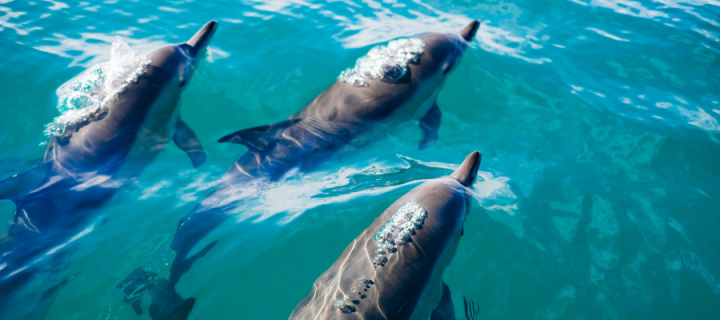Psychology researcher contributes to study finding dolphins have similar personality traits to humans
Psychology research finds dolphins’ personality resembles that of primates and other terrestrial species, including humans
Dr Alexander Weiss, Psychology researcher from the School of Philosophy, Psychology and Language Sciences, is one of four authors of a study published in the Journal of Comparative Psychology that examines the personality structure of bottlenose dolphins and the similar traits they share with primates, such as humans.

About the study
The purpose of the study was 1) to understand the evolutionary origins of personality structure of humans and animals, and 2) to better understand what evolutionary factors contributed to species variation in personality structure.
The study examined 134 bottlenose dolphins of which 56 were male and 78 were female. The dolphins were housed in 15 different facilities across eight countries.
Personality was measured in 49 dolphins using a 42-item questionnaire, and in 85 dolphins using a version of the questionnaire that included seven additional items.
Four personality domains
Despite having evolved in vastly different environments (i.e. terrestrial life versus marine life) and last sharing a common ancestor 95 million years ago, certain personality domains are shared between both dolphins and primates.
Three personality domains identified in the study—Openness, Sociability, and Disagreeableness—resembled personality domains found in nonhuman primates and other species. A fourth domain, directedness, was unique to dolphins. Unlike other species, but like humans, dolphins did not appear to have a strong Dominance domain.
This study shows that certain personality factors did not evolve in humans and other primates because they were associated with the survival and reproduction of terrestrial mammals or primates. Had these personality factors evolved in response to the demands of living on land, we would not expect to find them in dolphins.
Overlapping personality structure
Furthermore, dolphins share several behavioural and cognitive traits with primates, such as great apes, with the ability to:
- Form complex social bonds
- Display cultural traditions
- Possess cognitive abilities related to imitation, cooperation, and vocal recognition
- Have non-conceptive sex, or engaging in sex beyond the purpose of conceiving
- Engage in sexual coercion and Machiavellian behaviour
The overlap in personality structure between dolphins and other species suggests that selective pressures, such as those related to group structure, terrestrial lifestyles (life on dry land), morphology, and social learning or tool use, are not necessary for particular domains to evolve.
Overall, this study highlights something that both I and the lead author, Dr Blake Morton, have been saying for some time, namely that if we are to learn more about the evolution of personality in humans and other animals, we need to study it in a wide range of species.
International collaboration
The study, Personality Structure in Bottlenose Dolphins, began in 2012. Countries in which the facilities were based include Mexico, France, the Netherlands, Sweden, the US, the Bahamas, Curaçao and the Cayman Islands.
Along with Dr Weiss, the team of researchers involved in the research and publication of this study include, Dr Blake Morton from the University of Hull, Dr Lauren Robinson from the University of Veterinary Medicine Vienna and Georgia State University, and Sabrina Brando from AnimalConcepts in Spain and the University of Stirling.
Related links
Personality Structure in Bottlenose Dolphins
Journal of Comparative Psychology

